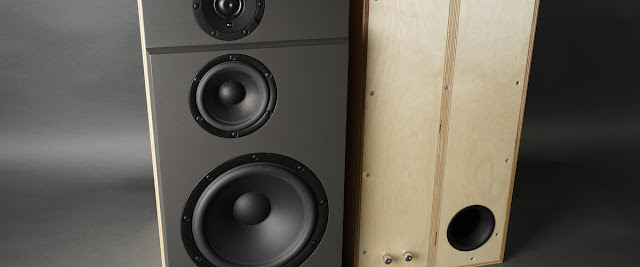The 3-Way Retro Part 1.
Note: I was initially calling this build The 3-Way Neo because I thought about it as a new take on the 3WC. But the Neo name calls for something new and nothing is really new about this build. It is more of a homage to the wide and shallow 3-way monitors of the 70s and the 80s. I have therefor renamed this project The 3-Way Retro.
Please refer to The 3-Way Retro, Revisit 1 post for a full summary if you want to build this speaker.
Most speakers I've built I built out of sheer curiosity. Some have been total failures but it has always been a learning experience. I based my version of the 3WC on a solid foundation, thanks Troels Gravesen for sharing. That speaker is probably the most versatile speaker I have ever built and I miss the sound of it. It didn't turn out exactly the way I anticipated but Troels design is not to blame. The black and white color scheme I selected gave them an unflattering Storm-trooper look and I never managed to put them on stands.
Another problem was my idea of going back to a fully passive design to be able to amp roll between my collection of vintage amps. I was contemplating the replacement of the vented design with a transmission line as a pair of classic floor standers. The idea was good but they grew in size. Another option was to go with a sealed design but I was not sure I could take the loss off efficiency. This lead me back to a semi-active design with a Linkwitz transform to keep form factor as small as possible without having to give up on bass extension.
I tried to cram this concept into different interesting forms when I stumbled upon The Ravens by Fern & Roby. What struck me the most was the form and the material. I did not plan on making a pair of speaker out of solid wood but maybe I could make it look a bit like it. The family did like the shape of The Ravens but preferred the stands of the Raven II. So I started to play around with a hybrid design inspired by both the Ravens and the Raven II. A design based on my take on Troels 3-Way Classic and I named the project the 3-Way Neo.
So the design goals for the 3WN is to reuse the elements and experience from the 3WC project. Make a new set of speakers with the same elements but with the look of the Ravens by Fern & Roby. Make it as compact as possible using a sealed design with a Linkwitz transform to extend the bass extension. But if possible make them big enough for an all passive crossover.
My first task was to use the enclosure tool in VituixCAD to get an idea of volume needed for the different chambers.
First the SB12MNRX25-4 in a closed box with Qtc = 0.707:
STATISTICS
f3 116.5 Hz
f6 88.5 Hz
f10 67.3 Hz
Zmin 3.2 Ohm @ 761.1 Hz
Zmax 25.5 Ohm @ 113.1 Hz
GDmax 2.4 ms @ 75.5 Hz
XmaxC 1.9 mm @ 5 Hz
Pmax 2.5 VA @ 761.1 Hz
-------------------------------------------------------------
DRIVER: SB Acoustics SB12MNRX25-4, 1 pcs in series
n0 0.25 % Reference efficiency
SPL 86.1 dB/W Sensitivity
USPL 90.1 dB/2.83 Sensitivity
EBP 138.1 Efficiency bandwidth product
Dd 8.0 cm Effective diameter of driver
Vd 22.5 cm^3 Maximum linear volume of displacement
Cas 3.89E-8 m^5/N Acoustic equivalent of Cms
Mas 1.96E2 kg/m^4 Acoustic equivalent of Mms+Mme
Ras 2E4 Ns/m^5 Acoustic equivalent of Rms
Rae 1.71E5 Ns/m^5 Acoustic equivalent of Re+Rg
-------------------------------------------------------------
BOX REAR 1: Vb=1.9 l, Ql=100.0
Fb 113.6 Hz System resonance frequency
Cab 1.35E-8 m^5/N Acoustic compliance of air in enclosure
Rab 3.46E3 Ns/m^5 Acoustic resistance due to absorption
Ral 1.04E7 Ns/m^5 Acoustic resistance due to leakage
Qtc 0.72 Total Q factor
Next the SB23NRXS45-8 in a closed box with Qtc = 0.707:
STATISTICS
f3 52.6 Hz
f6 40.6 Hz
f10 30.8 Hz
Zmin 5.6 Ohm @ 329.4 Hz
Zmax 60.6 Ohm @ 51.9 Hz
GDmax 5.2 ms @ 34.6 Hz
XmaxC 2.1 mm @ 5 Hz
Pmax 1.4 VA @ 329.4 Hz
-------------------------------------------------------------
DRIVER: SB Acoustics SB23NRXS45-8, 1 pcs in series
n0 0.44 % Reference efficiency
SPL 88.5 dB/W Sensitivity
USPL 90.1 dB/2.83 Sensitivity
EBP 65.9 Efficiency bandwidth product
Dd 16.6 cm Effective diameter of driver
Vd 140.4 cm^3 Maximum linear volume of displacement
Cas 6.65E-7 m^5/N Acoustic equivalent of Cms
Mas 5.25E1 kg/m^4 Acoustic equivalent of Mms+Mme
Ras 1.65E3 Ns/m^5 Acoustic equivalent of Rms
Rae 2.15E4 Ns/m^5 Acoustic equivalent of Re+Rg
-------------------------------------------------------------
BOX REAR 1: Vb=35.0 l, Ql=100.0
Fb 51.7 Hz System resonance frequency
Cab 2.48E-7 m^5/N Acoustic compliance of air in enclosure
Rab 4.14E2 Ns/m^5 Acoustic resistance due to absorption
Ral 1.24E6 Ns/m^5 Acoustic resistance due to leakage
Qtc 0.72 Total Q factor
And finally the SB23NRXS45-8 in a 30 liters closed box:
STATISTICS
f3 54.2 Hz
f6 41.8 Hz
f10 32.2 Hz
Zmin 5.6 Ohm @ 329.4 Hz
Zmax 59.2 Ohm @ 55 Hz
GDmax 5 ms @ 39.4 Hz
XmaxC 1.8 mm @ 5 Hz
Pmax 1.4 VA @ 329.4 Hz
-------------------------------------------------------------
DRIVER: SB Acoustics SB23NRXS45-8, 1 pcs in series
n0 0.44 % Reference efficiency
SPL 88.5 dB/W Sensitivity
USPL 90.1 dB/2.83 Sensitivity
EBP 65.9 Efficiency bandwidth product
Dd 16.6 cm Effective diameter of driver
Vd 140.4 cm^3 Maximum linear volume of displacement
Cas 6.65E-7 m^5/N Acoustic equivalent of Cms
Mas 5.25E1 kg/m^4 Acoustic equivalent of Mms+Mme
Ras 1.65E3 Ns/m^5 Acoustic equivalent of Rms
Rae 2.15E4 Ns/m^5 Acoustic equivalent of Re+Rg
-------------------------------------------------------------
BOX REAR 1: Vb=30.0 l, Ql=100.0
Fb 54.7 Hz System resonance frequency
Cab 2.12E-7 m^5/N Acoustic compliance of air in enclosure
Rab 4.56E2 Ns/m^5 Acoustic resistance due to absorption
Ral 1.37E6 Ns/m^5 Acoustic resistance due to leakage
Qtc 0.76 Total Q factor
- A box volume of 1.9 liters for the SB12MNRX25-4 -> f3 = 116.5
- A box volume of 35 liters for the SB23NRXS45-8 -> f3 = 52.6
- And a box volume of 30 liters for the SB23NRXS45-8 -> f3 = 54.2 and a Qtc = 0.76.
I ended up with the following dimension for my 3WN speaker:
- Height: 54 cm
- Width: 36 cm
- Depth: 24 cm
Why? Because 2/3 of 54 = 36 and 2/3 of 36 = 24, these proportions look good and the volume is in the right ballpark. Around 32 liters for the woofer with 2 liters for the mid-range and bracing if using 19 mm thickness for a baffle and 16 mm for the rest. This is my first sketch, time to cut some wood...







